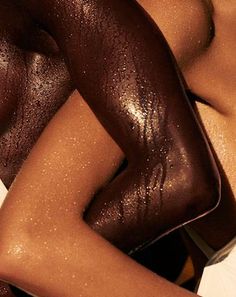
My early memories of lube aren’t flattering. An awkward mid-intimacy drawer rummage, only to produce a sticky, overused bottle that barely squeezes — and when it does, releases a cold, clinical-smelling goo, slapped onto your vulva without warning.
It felt like a scolding. Something that was reached for only when I wasn’t “wet enough.” It was delivered almost like an eye roll — a last resort, a product that came as a result of me. So yeah, I didn’t start out with a good relationship to lube.
I don’t want to blame the men, though. It wasn’t entirely their fault. They were taught even less about the female body than we were. How were they supposed to know the intricacies of what makes a woman wet (or not)? Most of their sex education came from porn — which told them they were meant to turn us on just by existing. That if they were hard, we’d be wet. That a vague touch somewhere on the vulva would be enough.
So when it didn’t work that way, of course they felt confused. Frustrated. Maybe even guilty or a little ashamed when they had to reach for lube.
But thankfully, we know better now.
In recent years, the sexual wellness industry has grown up and glowed up. We’re no longer relying on half-used tubes from the back of a pharmacy shelf at the bottom of someone’s drawer. Today’s lube comes in elegant, well-designed packaging, made with body-safe ingredients and intentions that go beyond just getting the job done. It’s become an extension of pleasure, not a correction for its absence.
More importantly, there’s more education — more real talk about hormones, vaginal health, pain during sex, arousal, and all the little factors that influence what our bodies do and don’t do. Lube is becoming a celebrated part of intimacy and pleasure.
And men? In my experience, they’re coming around, too. They’re less threatened by it. Less reactive. More curious. More collaborative. Because when we know that vaginal wetness is influenced by everything from cycle changes to medication to stress levels — we stop seeing lube as a failure and start seeing it as a tool. A way to show care, to enhance connection, to make sex better.
Lube isn’t something to be ashamed of — it’s something to get excited about. It’s not just for fixing a problem; it’s for making things feel even better. And it definitely doesn’t kill the mood — it adds to it.
But, if you’re still feeling unsure, here are five myths about lube that people have told me, and I’d like — us all — to leave behind.
“If you need lube, you’re not turned on enough.”
Let’s retire this one immediately, please.
Lube isn’t a sign of a lack of arousal — it’s a tool to enhance pleasure. Vaginal wetness is impacted by everything from hormones to stress to hydration. You can be wildly turned on and still not produce enough natural lubrication. Using lube just means you’re prioritising comfort and better sex — not failing at it.
“Lube is only for people who are older or have ‘issues.’”
Wrong again.
Lube isn’t just for menopausal or post-partum bodies — it’s for anyone who wants sex to feel better. It reduces friction, heightens sensation, and can make everything from penetration to hand stuff feel smoother and more delicious. It’s not a medical crutch — it’s a bedroom essential.
“All lubes are the same.”
Definitely not.
There are water-based, silicone-based, and oil-based lubes — and they all serve different functions. Water-based is safe with condoms and sex toys but may need reapplying. Silicone-based lasts longer and is great for shower sex, but not all toys are compatible. Oil-based is the most lush (IMO) but sometimes it can break latex condoms. Choosing the right lube matters — and it’s worth experimenting.
“Lube kills the mood.”
Only if your idea of a ‘mood’ is uncomfortable friction.
In reality, bringing lube into the mix often improves the mood. It allows for more ease, reduces discomfort, and can even be part of the foreplay. Think of it less like a clinical intervention and more like a sexy prop. Confidence is hot — and so is someone who knows how to take care of their (and your) pleasure.
“You don’t need lube if you’re using a condom.”
Actually, you probably need it even more.
Condoms can reduce natural lubrication, making things feel a bit drier or more friction-heavy. Adding lube (on the inside and outside of the condom) can make everything smoother, safer, and more pleasurable. Bonus: it also reduces the risk of condom breakage.




